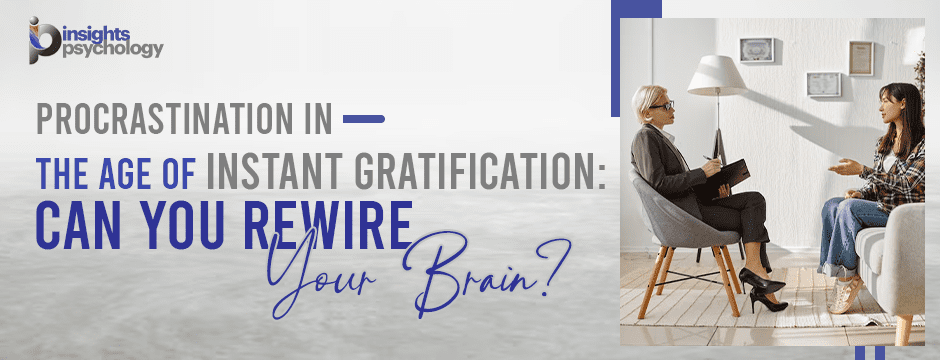In today’s hyper-connected world, waiting feels unnatural. We tap a screen and food arrives. We scroll and entertainment floods in. Instant gratification is the new normal—and it’s reshaping our brains, often in ways we don’t notice until it’s too late.
And nowhere is this more obvious than in our tendency to procrastinate. We tell ourselves we’ll start after one more episode, one more scroll, one more minute. Hours pass. Guilt builds. The task still looms. Sound familiar?
At Insights Psychology, we’ve spent years studying the science of procrastination—why it happens, how it’s evolving, and most importantly, how you can beat it. If you’re stuck in a cycle of delay and distraction, know this: it’s not a personal flaw. It’s a brain wiring issue. And yes, it can be rewired.
The Neuroscience of Procrastination: Why Your Brain Prefers Netflix Over Deadlines
Let’s start with your brain—because procrastination isn’t laziness. It’s a tug-of-war between two parts of your brain: the limbic system (your emotional, impulsive side) and the prefrontal cortex (your rational, future-planning self).
When a task feels unpleasant—say, writing that report or confronting an inbox full of unread emails—your limbic system kicks in with an emotional warning: “That sounds uncomfortable. Let’s do something easier.” The prefrontal cortex tries to reason, but it’s often no match against the dopamine high you get from a quick Instagram reel or dopamine-boosting snack.
This isn’t just theory. Brain scans show reduced activity in the prefrontal cortex in chronic procrastinators. Meanwhile, the brain’s reward system lights up when we choose distraction over discipline.
In the age of instant gratification, this conflict is even more extreme. We’re constantly surrounded by things engineered to be more appealing than the task at hand. Notifications. Pop-ups. Algorithmically tailored content. These hijack our brain’s reward circuitry and make deep focus feel boring by comparison.
But here’s the upside: neuroplasticity—the brain’s ability to change—means this wiring isn’t fixed. With consistent strategies, you can retrain your brain to crave follow-through more than avoidance.
If you want to know more, read the article ‘The Neuroscience of Procrastination: What happens in Your Brain?”
The Psychology of Procrastination: Why Do We Put Things Off, and How Can We Stop?
While the brain provides the hardware, psychology helps us understand the software—the mental stories, emotional states, and belief systems that shape our habits.
Here’s what The Psychology of Procrastination often looks like beneath the surface:
- Fear of failure – “If I don’t try, I can’t fail.”
- Perfectionism – “If it’s not perfect, it’s not worth starting.”
- Low self-worth – “I’m not good enough to finish this.”
- Overwhelm – “I don’t know where to begin.”
These mental traps create what psychologists call “task aversion”—a form of avoidance based on discomfort. And ironically, we procrastinate not because we don’t care, but because we care too much and feel paralyzed.
That’s why telling someone to “just do it” rarely works. What actually helps is breaking down the inner stories and reshaping how we relate to discomfort.
At Insights Psychology, we integrate evidence-based therapies like Cognitive Behavioral Therapy (CBT) and Acceptance and Commitment Therapy (ACT) to help clients develop healthier thought patterns, tolerate discomfort, and take action—even when it feels messy.
The truth is, procrastination isn’t a time problem. It’s an emotional regulation problem. And that’s exactly where psychotherapy can create lasting change.
Why Instant Gratification Makes Procrastination Worse
Instant gratification trains us to value now over later. It’s built into every app, every swipe, every shortcut. And while some conveniences are harmless, the cumulative effect is that our attention spans shrink and our tolerance for effort declines.
You’ve likely experienced the “intention-action gap.” You mean to do something meaningful—start that side project, clean your workspace, make that call—but a tiny friction point (like having to open a new tab) pushes you toward easier, faster dopamine instead.
And this isn’t your fault. It’s brain chemistry at work. In fact, researchers in procrastination science have found that people are more likely to delay tasks when they anticipate immediate discomfort and when more enjoyable alternatives are readily available.
Here’s the kicker: the more we indulge in instant rewards, the less satisfying long-term rewards feel. The brain adapts to the high-speed feedback loop, and real-world tasks—like studying, building a business, or healing emotionally—start to feel unbearably slow.
But with intention and structure, you can reverse that pattern.
Can You Rewire Your Brain? Yes—Here’s How
So, how do you retrain your brain away from procrastination and back toward purpose?
Here’s what we recommend at Insights Psychology:
1. Micro-commitments over mega-goals
Your brain fears big, ambiguous tasks. But it doesn’t mind tiny, clear ones. Instead of “write my thesis,” try “open the document and type one sentence.” Often, the act of starting reduces resistance.
2. Reframe discomfort
In therapy, we teach clients to reframe discomfort not as a signal to stop, but as a sign of growth. Discomfort isn’t danger. It’s progress in disguise.
3. Reward discipline, not results
Ditch the idea that you must be “done” to feel good. Instead, reward yourself for showing up. Did you write for 10 minutes? Celebrate it. This trains the brain to associate effort with dopamine.
4. Limit exposure to instant gratification
Create friction between you and distractions. Log out of social media, use website blockers, put your phone in another room. The less accessible the quick hit, the more likely you’ll turn toward deeper work.
5. Get psychological support
Sometimes procrastination is just a symptom of deeper mental roadblocks—like anxiety, trauma, or low self-worth. That’s why individualized therapy is one of the most powerful ways to break the cycle. You’re not just addressing the behavior; you’re healing the root cause.
Why Businesses and Creatives Are Especially at Risk
If you’re an entrepreneur, a creative, or a knowledge worker, procrastination can silently bleed revenue and momentum from your life. You don’t have a manager breathing down your neck, and deadlines often blur.
This is where procrastination science becomes more than just self-help—it becomes a business asset. Imagine what you could build if you no longer postponed the work that matters most. Imagine how much clarity and confidence you’d reclaim if your brain stopped craving the easy way out.
At Insights Psychology, we work with entrepreneurs, artists, executives, and everyday professionals who want to operate from intention—not impulse. Our goal is to help you close the gap between knowing and doing.
The Bottom Line: You’re Not Broken—You’re Just Wired for Now
If you’ve been stuck in a loop of delay, self-blame, and stress, take a breath. You’re not lazy. You’re not incapable. You’re simply human in an age that’s engineered for distraction.
The good news? You’re also capable of growth. The same brain that’s wired for instant gratification can be rewired for focus, follow-through, and fulfillment.
Procrastination science isn’t about hacks. It’s about understanding how your mind works—so you can stop fighting yourself and start working with yourself.
If you’re ready to break the cycle and reclaim control, we’re here to help.
Ready to Take the First Step?
At Insights Psychology, we don’t offer cookie-cutter solutions. We provide tailored therapy rooted in science, psychology, and deep human connection. Whether you’re a professional burning out, a student struggling with deadlines, or someone just tired of feeling stuck—we’ve seen your story before. And we know how to rewrite it.
Let’s work together to retrain your brain, rewrite your patterns, and rediscover your potential.
FAQ: Take Control of Procrastination—With Professional Help
1. How does instant gratification fuel chronic procrastination in today’s digital age?
In today’s tech-driven world, instant gratification trains the brain to crave quick rewards, leading to chronic delay. According to the science of procrastination, the constant dopamine hits from phones, social media, and entertainment weaken your brain’s ability to delay gratification. Therapy helps individuals break this cycle by rewiring reward patterns. At Insights Psychology, our specialists guide you in identifying triggers and building discipline through structured, therapeutic strategies that restore focus and productivity.
2. Can procrastination actually rewire your brain’s reward system over time?
Yes—procrastination is the act of unnecessarily delaying or postponing something, and over time, it reshapes your brain’s reward pathways. The neuroscience of procrastination reveals that avoidance behaviors can strengthen the brain’s preference for short-term relief. Therapy can help reverse this rewiring. At Insights Psychology, we offer tailored therapeutic interventions that rebuild healthier habits and support long-term motivation. If you’re tired of feeling stuck, now is the time to retrain your brain with professional guidance.
3. What cerebral ways help break the cycle of procrastination and quick prices?
To break the procrastination-reward loop, therapists recommend:
- Cognitive Behavioral remedy( CBT) to query unsympathetic notes
- Time-blocking to structure focus periods
- The Pomodoro system for low-lying, timed composition sessions
- Reward restructuring to make delayed outcomes feel more rewarding
These techniques align with the psychology of procrastination by retraining your brain to value effort over instant gratification and helping a procrastinator person regain productivity.
4. Is procrastination a sign of deeper psychological health issues like anxiety or ADHD?
Often, yes. The psychology of procrastination shows that chronic avoidance is frequently linked to conditions like anxiety, depression, or ADHD. Many characteristics of a procrastinator person—such as indecision, overwhelm, and fear of failure—are red flags of deeper emotional concerns. At Insights Psychology, our therapists conduct thorough evaluations to uncover root causes and build targeted treatment plans. Early intervention through therapy can make a meaningful difference in both performance and wellbeing.
5. Can therapy help retrain your brain to resist distractions and delay gratification?
Absolutely. therapeutic gates into the neuroscience of procrastination to help retrain your brain’s response to distractions and bounties. Our clinicians at Insights Psychology use tools like CBT, executive functioning coaching, and mindfulness-based approaches to strengthen focus and delay gratification. Whether you’re a student, creative, or professional, therapy offers a structured and effective way to build discipline in a world full of distractions.
6. What are the long-term effects of digital overstimulation on procrastination behavior?
Digital overstimulation reinforces procrastination by conditioning your brain to seek easy dopamine through scrolling, streaming, or multitasking. Over time, this erodes attention span, motivation, and decision-making capacity. The science of procrastination warns that unchecked digital habits may lead to long-term productivity issues. At Insights Psychology, we help clients build awareness, set boundaries, and develop healthy routines through therapy—offering real solutions for real change in today’s hyper-distracted world.
7. How can you rewire your brain for focus and discipline in an age of constant dopamine hits?
Rewiring your brain involves consistent practice rooted in the science of procrastination. Key strategies include:
- Limiting digital exposure to reduce dopamine spikes
- Establishing daily routines that promote deep work
- Delaying rewards until tasks are complete
- Practicing mindfulness to boost self-regulation
Even famous procrastinators have used these methods to rebuild focus. With time, these habits create lasting neural changes that favor discipline over distraction.
If you’ve ever felt stuck between creative ambition and chronic delay, there’s hope. Find out why therapy is a safe space where artists finally move forward.

